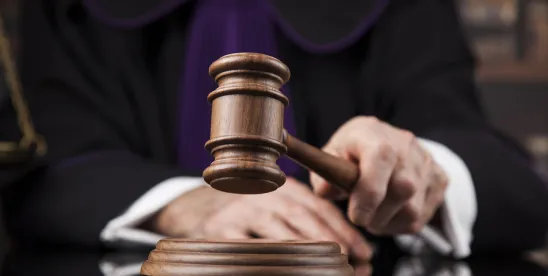In most product liability and mass tort cases, plaintiffs sue more than one defendant. Very often, those defendants will assert cross-claims for contribution against each other, alleging that the other defendants share some or all of the liability for plaintiff’s injuries. In New Jersey, when some but not all of the defendants settle with plaintiff, the cross-claims for contribution of the non-settling defendant are extinguished by operation of the New Jersey Joint Tortfeasor Contribution Law, N.J.S.A. 2A:53A-1, et seq. Although the non-settling defendant’s cross-claims are extinguished, the nonsettling defendant may still seek to include the settled defendants on the jury verdict sheet for purposes of receiving a credit, provided it can establish that the settled defendants are at least partially liable for plaintiff’s injuries. As a result, in multidefendant cases where only one defendant remains at trial, the non-settling defendant may seek to introduce evidence that establishes the liability of the settled defendants.
In Rowe v. Bell & Gossett Co., No. A-4530-1472, 2018 N.J. Super. Unpub. LEXIS 1560 (App. Div. June 29, 2018), the New Jersey Appellate Division addressed several evidentiary rules that affect the types of evidence a non-settling defendant can introduce to “point the finger” at the settled defendants for purposes of liability apportionment. The court ultimately held that standard evidentiary rules apply in such situations. New Jersey evidence rules allow the introduction of deposition testimony and interrogatory responses only against the party that provided such testimony or responses. The court held that a non-settling defendant cannot rely on these exceptions to the hearsay rule to introduce deposition testimony and interrogatory responses from the settled defendants because the evidence is being offered against the plaintiff and not the settled defendants, who are no longer in the case.
Case Discussion
In Rowe, the deceased worked with various asbestos-containing products during his thirty year career. Plaintiff alleged that the decedent’s exposure to asbestos caused him to develop mesothelioma. Plaintiff’s initial complaint named twenty-seven defendants that manufactured, supplied or sold the asbestos-containing products to which the decedent was allegedly exposed. Most of those defendants were eventually dismissed from the action and prior to trial, eight other defendants settled with plaintiff. Plaintiff proceeded to trial against the one remaining defendant, Universal Engineering Co., Inc. (“Universal”), which manufactured asbestos-containing furnace cement that the decedent used during his career.
At trial, plaintiff’s expert testified that while the decedent’s exposure to the settled defendants’ products were “substantial contributing factors” to the decedent’s illness, he believed that Universal’s cement was the primary cause. Universal’s expert, however, testified that the amount of asbestos contained in Universal’s cement was insufficient to cause the decedent’s mesothelioma. In addition to this expert testimony, Universal introduced evidence of the decedent’s exposure to the settled defendants’ asbestos-containing products in order to include the settled defendants on the verdict sheet so the jury could apportion liability amongst them for purposes of a credit. Although Universal served notices in lieu of subpoena, the settled defendants advised Universal that their witnesses were either out of state or were unavailable. Over plaintiff’s objections, the trial court permitted Universal to introduce deposition testimony and interrogatory responses from the settled defendants in order to establish their liability for the decedent’s development of mesothelioma.
At the conclusion of the evidence, the jury awarded plaintiff $1.5M in damages but only apportioned 20% liability to Universal. The jury apportioned the remaining 80% of liability amongst the eight settled defendants. The trial court molded the verdict and awarded plaintiff $300,000 against Universal. Plaintiff appealed the verdict to the Appellate Division.
Product Liability Law |
On appeal, Plaintiff argued that the trial court erred by allowing the introduction of the settled defendants’ deposition testimony and interrogatory responses. Plaintiff claimed that Universal’s evidence did not fall within any of the exceptions to the hearsay rule. Universal argued that the settled defendants’ deposition testimony and interrogatory responses were admissible hearsay under New Jersey Court Rules 4:17-8(a) and 4:16-1(b), and N.J.R.E. 803(b)(1), which allow the admission of deposition testimony and interrogatory responses against the party that provided the deposition or interrogatory responses. However, the court rejected Universal’s argument that it had offered the deposition testimony and interrogatory responses against the settled defendants. The Appellate Division explained that Universal’s cross-claims against the settled defendants were extinguished once the settled defendants settled plaintiff’s claims. As a result, the court held that Universal’s evidence had been introduced to defeat plaintiff’s claims and not to establish any affirmative claims against the settled defendants. Accordingly, the court held that the settled defendants’ deposition testimony and interrogatory responses were not admissible under New Jersey’s exceptions to the hearsay rule because they were offered against plaintiff and not the settled defendants.
Finally, the Appellate Division also rejected Universal’s argument that the settled defendants’ deposition testimony was not admissible under N.J.R.E. 804(a) & (b) (providing for the admission of hearsay when a witness is unavailable) because
Universal failed to adequately establish that the settled defendants were, in fact, “unavailable.” The court explained that the party seeking to introduce deposition testimony under this rule bears the burden of showing that it had exhausted all reasonable means of securing the witness’s testimony. Although Universal had served the settled defendants with trial notices in lieu of subpoena, Universal simply accepted their representation that witnesses were either out-of-state or unavailable. The court explained that because the settled defendants had been parties to the litigation, they were required to provide witnesses to testify at trial even if they were located out of state. The court held that Universal failed to meet its burden of establishing unavailability because it made no attempts to follow-up on the notices in lieu of subpoena (i.e., advise the settling defendants that the notices in lieu of subpoena remained in effect and that they had an obligation to appear or to request the names and schedules of a live witness for trial). In the court’s view, Universal “essentially inquired whether the settling defendants planned to voluntarily appear and then confirmed that they did not.”
Ultimately, the Appellate Division reversed the verdict and remanded the case for a new trial on apportionment.
What Does this Case Mean?
Rowe is an important decision that provides defendants in multi-defendant cases with a roadmap of the steps that a non-settling defendant must take to ensure that it can successfully admit evidence to establish the liability of settled defendants. It re-affirms that defendants in multi-defendant product liability and toxic tort cases need to timely and carefully consider how hearsay and evidentiary rules impact their trial strategy. The court’s decision also re-affirms the New Jersey’s preference for live witness testimony at trial, and the due diligence expected of non-settling defendants to secure it.





 />i
/>i

